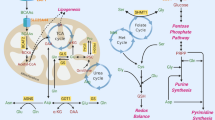Abstract
Human diploid fibroblasts growth normally in medium containing physiological concentrations of the naturally occurring dipeptide carnosine (beta-alanyl-L-histidine). These concentrations are cytotoxic to transformed and neoplastic cells lines in modified Eagle medium (MEM), whereas these cells grow vigorously in Dulbecco's modified Eagle medium (DMEM) containing carnosine. This difference is due to the presence of 1 mM sodium pyruvate in DMEM. Seven human cell lines and two rodent cell lines were tested and all are strongly inhibited by carnosine in the absence of pyruvate. Experiments with HeLa cells show that anserine is similar to carnosine, but D-carnosine and homocarnosine are without effect. Also, the non-essential amino acids alanine and glutamic acid contribute to the effect of pyruvate in preventing carnosine toxicity, and oxaloacetate and alpha-ketoglutarate can substitute for pyruvate. We have used mixtures of normal MRC-5 fibroblasts and HeLa cells to demonstrate that 20 mM carnosine can selectively eliminate the tumour cells. This has obvious implications which might be exploited in in vivo and in vitro studies. Carnosine is known to react strongly with aldehyde and keto groups of sugars by Amadori reaction, and we propose that it depletes certain glycolysis intermediates. It is well known that tumour cells are more dependent on glycolysis than normal cells. A reduction of glycolysis intermediates by carnosine may deplete their energy supply, but this effect is totally reversed by pyruvate.
This is a preview of subscription content, access via your institution
Access options
Subscribe to this journal
Receive 24 print issues and online access
$259.00 per year
only $10.79 per issue
Buy this article
- Purchase on Springer Link
- Instant access to full article PDF
Prices may be subject to local taxes which are calculated during checkout
Similar content being viewed by others
Author information
Authors and Affiliations
Rights and permissions
About this article
Cite this article
Holliday, R., McFarland, G. Inhibition of the growth of transformed and neoplastic cells by the dipeptide carnosine. Br J Cancer 73, 966–971 (1996). https://doi.org/10.1038/bjc.1996.189
Issue Date:
DOI: https://doi.org/10.1038/bjc.1996.189
This article is cited by
-
Radio-selective effects of a natural occurring muscle-derived dipeptide in A549 and normal cell lines
Scientific Reports (2019)
-
Carnosine selectively inhibits migration of IDH-wildtype glioblastoma cells in a co-culture model with fibroblasts
Cancer Cell International (2018)
-
Carnosine suppresses oxygen-glucose deprivation/recovery-induced proliferation and migration of reactive astrocytes of rats in vitro
Acta Pharmacologica Sinica (2018)
-
Glycotoxins: Dietary and Metabolic Origins; Possible Amelioration of Neurotoxicity by Carnosine, with Special Reference to Parkinson’s Disease
Neurotoxicity Research (2018)
-
β-Alanine intercede metabolic recovery for amelioration of human cervical and renal tumors
Amino Acids (2017)



